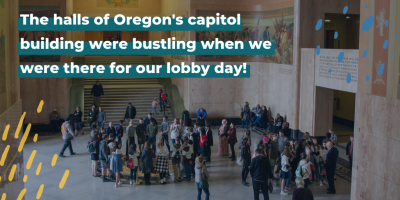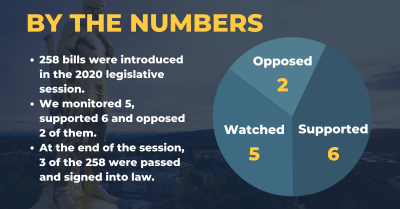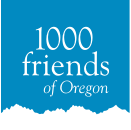The 2020 Oregon legislative session is over; while the last day was to be March 8, the session ended on March 5 because most Republican legislators failed to come to the Capitol for the prior two weeks, resulting in a lack of quorum. During this time, 1000 Friends tracked numerous bills, submitted comments, testified and engaged with legislators. We held both our annual Lobby Day and special Farmer Advisory Committee meetings in Salem, where our friends, members, affiliates, farmers, ranchers and foresters met with legislators and their staff.
Much of this was accomplished before the walkout even began, thanks to our legislative and program teams and our passionate members and affiliates. Using the power of our digital platforms, we engaged over 25,000 members and followers, and over 100 messages were sent to legislators directly from our action alerts.

Bills we opposed
Because the walkout effectively ended the session early, all the legislation we were tracking died without a vote. Two land use bills we opposed ended up not getting voted on. These bills would have expanded the ability to develop housing on farmland, particularly without analysis of impacts to adjacent farming operations.
One bill we opposed, SB 1555, would have allowed outright dwellings for religious officials on farmland, without any analysis of impacts to adjacent farming operations. We opposed this bill because it would allow another nonfarm use on farmland and result in unequal treatment of persons.
Bills we supported
1000 Friends supported more legislation than we opposed. Here are six bills and key funding mechanisms we were hoping to pass, which died:
-
The climate bill — SB 1530 — would have reduced greenhouse gas emissions from the urban transportation sector and invested in carbon sequestration, conservation, and other techniques in rural Oregon:
-
The bill would have allocated 25% of its funds to benefit natural and working lands, 25% to the State Forestry Department for wildfire mitigation efforts and 10% to Indian tribes.
-
SB 1530 would have benefitted Oregon’s farmers, ranchers and foresters while helping the state prepare for the increasing severity of wildfire seasons.
-
SB 1530 would have also allocated funds to the state’s 8 largest urban areas to reduce greenhouse gas emissions from the transportation sector, through integrated land use and transportation planning - resulting in more walking, bicycling, and transit options.
-
-
SB 1536 included many recommendations of the Governor’s Council on Wildfire Response, including using land use tools to address wildfire hazards. The bill addressed numerous issues relating to wildfire hazard planning, protection, fuel treatments and response.
-
We support the development of a statewide wildfire hazard map and the adoption of minimum defensible space standards for areas identified as susceptible to wildfire.
-
-
Funding for the Oregon Agricultural Heritage Program
-
Oregon lost 340,000 acres of agricultural land between 2012-2017, according to recent USDA census information, underscoring the need to fund solutions — in addition to our land use tools — that protect farm and ranch lands. In 2017, the legislature established the Oregon Agricultural Heritage Program (OAHP), but it has yet to be funded. If funded, OAHP would help keep working lands in production, provide resources for succession planning, and leverage a significant federal funding match through the federal Farm Bill. $5 million in funding through this bill was not approved, but the program will continue for now.
-
-
HB 4001 was a critically important bill on homelessness. We worked to ensure that homeless shelters not be allowed on EFU and forest lands. Working lands can pose hazards of dust, chemicals, and more, and are remote from the things people need to regularly access, like food and services. Representative Kotek removed the allowance on EFU lands, and we supported this bill.
-
HB 4090 would have included Pendleton in a pilot program approved in the 2016 session and modified in 2019. That original bill allowed — for two cities — a UGB expansion of up to 50 acres if 30% of the land is used for affordable housing and meets other conditions. Pendleton qualifies as the “smaller city” the original bill provided for but was not ready to apply to be a pilot project at that time. Since no smaller city has filled that second pilot project spot, HB 4090 would have allowed Pendleton to now apply.
-
HB 4095 originally would have expanded the “pilot project” described previously in HB 4090 to all Oregon cities. Thanks to 1000 Friends’ efforts, the original language of HB 4095 had been entirely replaced with a requirement that DLCD continue to submit to the legislature regular reports on the pilot project bill that passed in 2016, but which is still being implemented and so needs an extension of the original reporting requirement if we are to learn from it

There is one other important development from the end of the session: Governor Kate Brown’s Executive Order on Climate Action. 1000 Friends supports the Governor’s recognition of the key role that Oregon’s natural and working lands agencies and industries can play in sequestering carbon and planning for the impacts of climate change. Under the order, state agencies will be tasked with reducing greenhouse gas emissions, and we look forward to working with them to integrate working and natural lands into the equation.
The executive order also directly impacts Oregon's land use and transportation planning system. It recognizes that "emissions from the transportation sector are the single largest source of GHG emissions in Oregon," and that actions to reduce GHG emissions from this sector will provide "substantial" co-benefits, including for public health.
Therefore, the executive order directs the Departments of Land Conservation & Development (DLCD) and Transportation (ODOT) to amend LCDC's Transportation Planning Rule (TPR) so the 8 major urban areas of the state amend and adopt transportation system plans that will achieve each urban area's already-assigned GHG reduction targets. (See Item 9 in the order). This means increasing options that allow people to walk, cycle, and use transit, and ensuring higher-density, mixed-use housing is located near transit. It also means ensuring that most neighborhoods have high walking and biking scores. The executive order directs ODOT and DLCD to focus technical and financial resources on this type of planning and the implementation of it.
The session may be over, but it won’t be long before the process starts all over again — and we’re ready to continue to advance our mission: working with Oregonians to enhance our shared quality of life by building livable urban and rural communities, protecting family farms and forests, and conserving natural areas.
In preparation for the next session, we’ll be continuing our program and legislative work as usual (from our virtual home offices for the time being). Our legislative and program staff will be engaging on land use issues at the city, county and state levels, working with the Governor’s Council on Wildfire Preparation, and continuing to shape smart land use legislation throughout Oregon.
